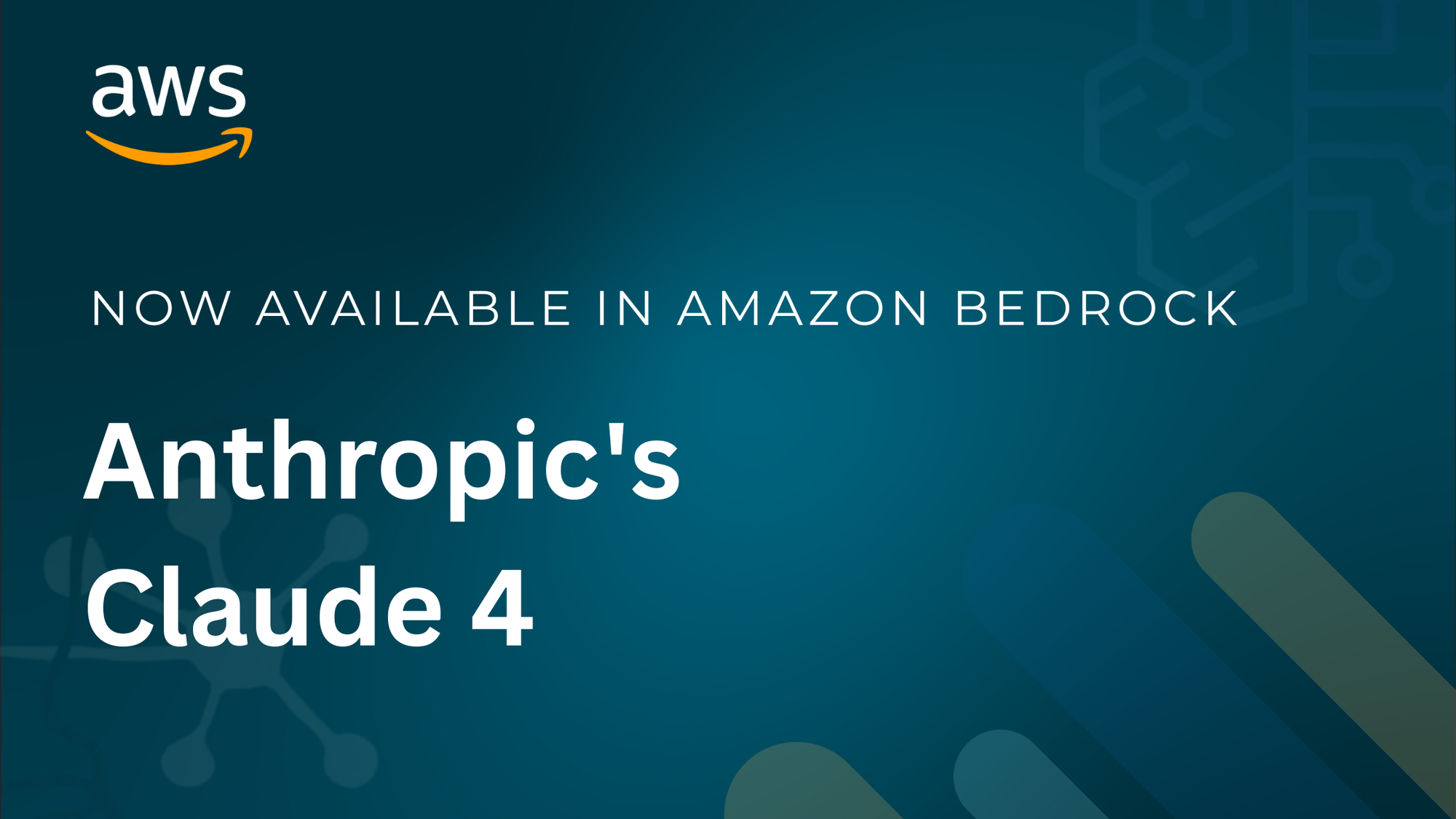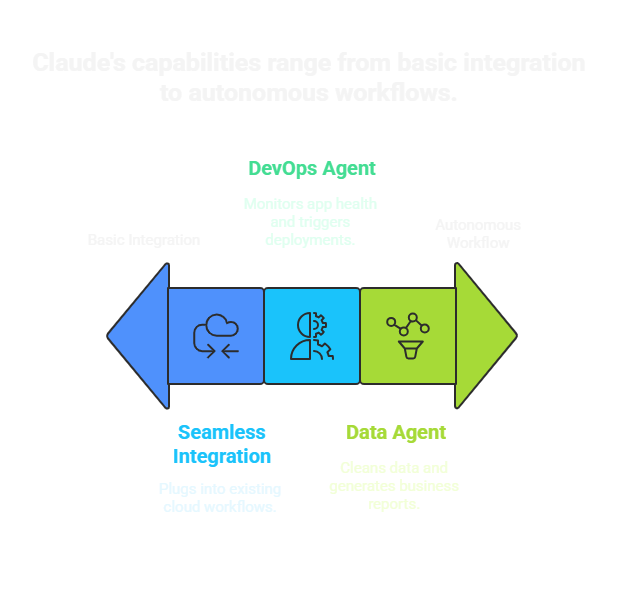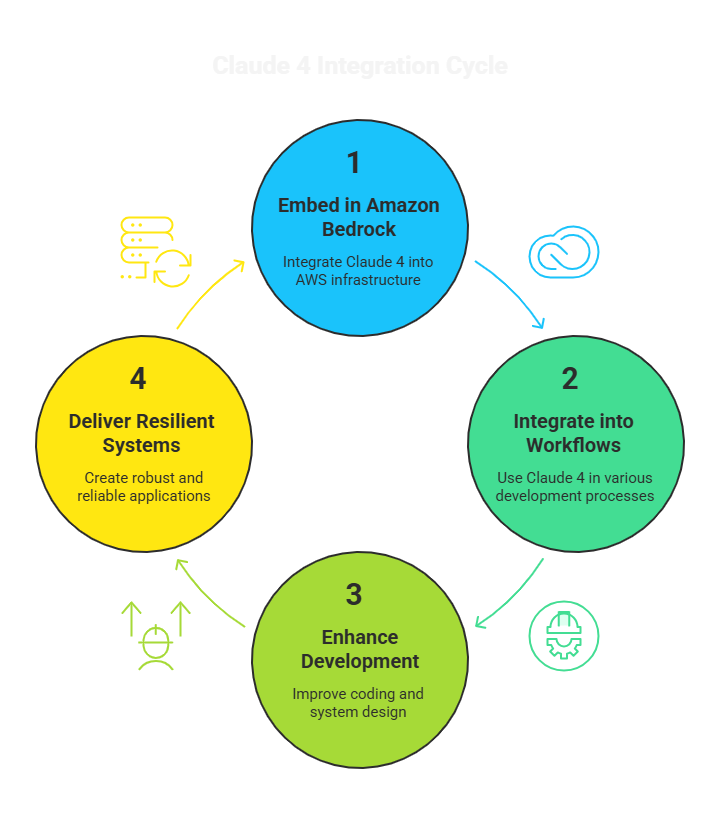Claude 4 in Amazon Bedrock: Redefining AI-Driven Software Development
Anthropic meets AWS — enabling agentic AI, faster builds, and enterprise-grade automation.

Introduction
The AI landscape continues to evolve rapidly, with each innovation raising the bar for what's possible in software development, enterprise automation, and intelligent agents. The latest leap comes from Anthropic, which introduced its Claude 4 family—a suite of cutting-edge AI models—now available via Amazon Bedrock. This integration represents a significant milestone in democratizing access to powerful AI tools that can act as assistants, co-architects, and execution engines for complex digital systems.
Whether you're a developer looking to streamline code generation or a CTO exploring AI-driven transformation strategies, Claude Opus 4 and Claude Sonnet 4 offer capabilities that redefine the boundaries of generative AI in the enterprise.
Claude 4 + Amazon Bedrock = Smarter Software Architecture

1. Seamless Integration into Enterprise Infrastructure
By hosting Claude 4 models on Amazon Bedrock, AWS has made it incredibly easy for organizations to plug these models into existing cloud-native workflows. With just a few lines of code, teams can access Claude’s power across Lambda functions, S3, RDS, and other services.
No model training. No GPU provisioning. No infrastructure headaches.
This integration also ensures:
- Fine-grained access control using IAM
- Monitoring & observability via Amazon CloudWatch
Regional data residency and compliance with industry standards
2. Unlocking Agentic Workflows
Claude 4’s true innovation lies in its support for agentic workflows—systems in which AI models simulate roles, delegate tasks, and collaborate autonomously. Imagine a Claude-powered “DevOps agent” that can:
- Monitor app health metrics
- Trigger deployment workflows
- Validate pull requests
- Generate unit tests
Or a “data agent” that:
- Pulls raw logs from S3
- Cleans and transforms data.
- Trains a model
- Generates a business-ready report
These workflows can be fully orchestrated with Claude Opus 4, making intelligent decisions at every step.
3. Fine-Tuned for Business Context
Anthropic’s training approach for Claude 4 emphasizes alignment, safety, and usefulness. Unlike generic LLMs, Claude models are optimized for enterprise utility:
- Responds with low hallucination risk
- Handles sensitive prompts safely
- Adapts to domain-specific language (finance, healthcare, legal, etc.)
- Produces explainable, auditable outputs
This makes Claude 4 suitable for regulated industries where accuracy and accountability are non-negotiable.
Why Claude Opus 4 Is a Game-Changer for Developers
Claude Opus 4 is built for deep code comprehension, multi-step reasoning, and agentic workflows—perfect for developers looking to automate architecture decisions or debug large-scale systems. Early Benchmarks demonstrate that Claude Opus 4 surpasses previous-generation models in key areas such as:
- Code generation accuracy
- Natural language reasoning
- Complex task planning
- Multi-agent orchestration
This makes Opus 4 ideal for high-stakes environments like fintech, cybersecurity, and enterprise software, where AI needs to act like a senior developer, not just a chatbot.
Developer Experience: Building with Claude 4 on Bedrock
Getting started is simple:
- Choose your model: Select Claude Opus 4 or Claude Sonnet 4 from the Bedrock model catalog.
- Integrate via SDK: Use AWS SDKs to connect to Claude endpoints from JavaScript, Python, or Java.
- Invoke via REST API: Send a prompt, receive a structured JSON response—easy integration into apps.
Deploy at scale: Use Amazon SageMaker or Lambda for serverless inference at scale
Sample prompt for Claude Opus 4: json
CopyEdit
{
"prompt": "Refactor this Python script to use async functions and add error handling.",
"modelId": "anthropic.claude-opus-v4",
"temperature": 0.5
}
Claude Sonnet 4: The Reliable Powerhouse for High-Volume Tasks
If Opus 4 is your AI architect, then Claude Sonnet 4 is your tireless engineer. It specializes in high-volume, repeatable tasks like:
- Document processing
- Report generation
- Structured data extraction
- Content formatting and QA
For teams needing reliable output at scale, Sonnet 4 ensures consistency without sacrificing intelligence.It delivers the full strength of Claude’s capabilities to workflows where both speed and precision are essential.
Real-World Impact: From Code to Cloud
By embedding Claude 4 into Amazon Bedrock, AWS enables seamless model invocation through familiar SDKs and APIs.These models can be seamlessly integrated by developers and data scientists into:
- CI/CD pipelines
- Data engineering workflows
- Application backends
- Serverless functions
With Claude Opus 4 and Claude Sonnet 4, teams can design smarter, code faster, and deliver more resilient systems—all from within the trusted AWS ecosystem.

What This Means for Enterprises
For enterprises already invested in AWS, the Claude 4 integration in Bedrock is a strategic advantage. It reduces the time to AI integration, supports multi-model orchestration, and ensures compliance across regions and industries.
Expect to see more enterprises re-architecting legacy systems, automating knowledge tasks, and enhancing customer experiences—all powered by Claude 4 on Amazon Bedrock.
The Future of Claude in the AWS Ecosystem
This is just the beginning. AWS and Anthropic are committed to expanding Claude’s capabilities, with future features potentially including:
- Custom fine-tuning with enterprise data
- Memory-enabled persistent agents
- Claude-powered AWS Console Copilot
- AutoML orchestration and pipeline automation
As generative AI matures, expect to see Claude agents embedded in developer IDEs, business dashboards, and customer portals, accelerating productivity across the board.
Conclusion:
With Claude 4 models now integrated into Amazon Bedrock, the future of AI-assisted development is not just promising—it’s here. Whether writing code, automating documents, or orchestrating intelligent agents, Claude Opus 4 and Claude Sonnet 4 offer unmatched performance, flexibility, and trust.
By uniting Anthropic’s advanced AI capabilities with AWS’s scalable infrastructure, businesses are empowered to accelerate development, enhance automation, and drive innovation with confidence.
You can learn more about evaluating the Anthropic Claude 3 model on AWS Bedrock using FMEval in our detailed guide

FAQs
1. What distinct roles do Claude Opus 4 and Claude Sonnet 4 play?
Answer: Claude Opus 4 excels in intricate tasks like software architecture and multi-step reasoning. In contrast, Claude Sonnet 4 is engineered for high-volume, repetitive operations, such as document processing and report generation, ensuring consistent and efficient output at scale.
2. What core advantages does integrating Claude 4 with Amazon Bedrock offer?
Answer: This integration provides effortless alignment with existing AWS workflows, eliminating the need for model training or GPU setup. You also get robust security via IAM, detailed monitoring with CloudWatch, regional data compliance, and access to sophisticated agentic AI capabilities.
3. Could you explain "agentic workflows" and how Claude 4 facilitates them?
Answer: "Agentic workflows" involve AI models acting autonomously, collaborating to achieve complex goals. Claude 4 empowers these by enabling AI to delegate tasks and make informed decisions, much like an AI "DevOps agent" managing application health or a "data agent" processing raw information into reports.
4. How straightforward is it for developers to begin using Claude 4 on Amazon Bedrock?
Answer: Developers can easily select either Claude Opus 4 or Sonnet 4 from the Bedrock catalog. Integration is simple using AWS SDKs (JavaScript, Python, Java) or REST APIs, and deployment at scale is supported via Amazon SageMaker or Lambda, streamlining application development.
5. Which businesses stand to gain most, and what's next for Claude within AWS?
Answer: AWS-invested enterprises, particularly in regulated sectors, will see significant advantages. Future enhancements for Claude within AWS include custom fine-tuning with proprietary data, AI agents with memory, a Claude-powered AWS Console Copilot, and seamless integration into development environments.

